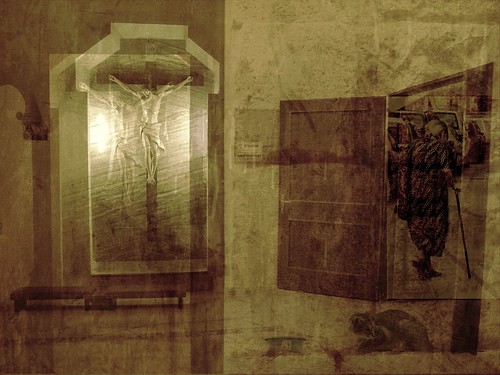
"Jesus double." Art by Sy Parrish on Flickr.
That same question was posed to the people at the 7AM morning mass at my parish, and there was a surprising number of people ready with heartfelt answers: He is my Lord and savior. He is my salvation. He is king, though I don't know what king means in this day and age. He is my friend who cares for me. He is the Lord whom I follow.
All of them, sincere answers. Each of them, a homily waiting to unfold.
I would venture to add that the readings taken together posit something more, and carry a warning as well as a hope.
He is almighty and powerful.
In the first reading (Gen 9:1 to 13), He is the Lord of the covenant -- the one who wiped out man's evil from the world with a great flood, and the same one who promised Noah and his descendants that He would never do so again.
He is holy and merciful.
In the Responsorial Psalm taken from Psalm 102, He is the Lord who looks down from heaven upon the earth, the one who regards the prayer of the destitute, hears the groaning of prisoners and releases those doomed to die.
He is Messiah and Lord.
And finally in the Gospel of Mark 8:27-33, Peter speaks for us when he says that Jesus is the Messiah, the Christ, the Lord whom we follow. And yet, a few moments later, concerned about Jesus revelation that He would suffer and die, Peter goes on to rebuke Jesus.
Rebuke is a strong word, one that means to criticize and censure angrily. And I imagine the all-too-human Peter disagreeing with Jesus, asking why this has to be so, wondering if there were a way to protect Jesus from death and suffering.
Jesus turns around and rebukes Peter in return, calling the apostle "Satan," one of the most vehement declarations from the mouth of the Lord. And why? Because if indeed He was Lord, then Peter had to trust in the divine plan, had to submit his human will to the divine will of God.
Therein lies our challenge as Catholics and Christians.
If we say He is Lord of our lives, the leader whom we follow, the almighty who cared enough to save us from sin... then do we relinquish control to Him? Do we trust in Him when the chips are down and trials surround us? Do we follow Him completely despite not understanding how we could be suffering so?
If we don't trust Him then we impose our own selfish wills on our lives and, like Peter, begin to think as humans do instead of as God does. We become "Satan" because we oppose God by going our own way and trusting our own strengths and schemes.
If indeed He is Lord to us, then His wishes are our commands. And His wish is for us to know Him, to love Him and to follow Him... even as He leads us through the dark valleys.
Good post and good question we all need to answer honestly. All to often I see myself in Peter. Lent is a good time to adjust our words and actions to who we say He is.
ReplyDeleteGod Bless!